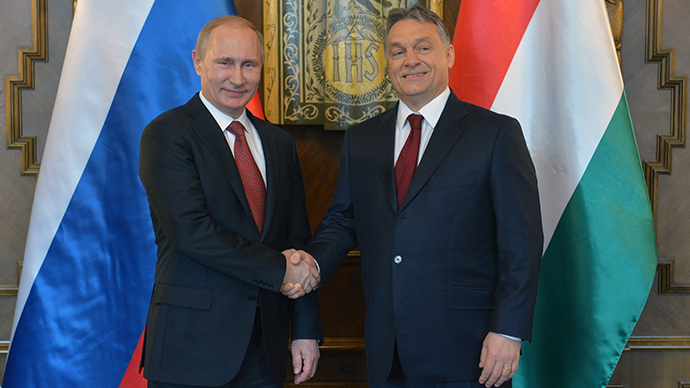‘Europeans shoot the messenger by attacking Hungary’s Orban for receiving Putin’

Viktor Orban may face criticism for hosting Putin despite an EU ban on bilateral summits, but many leaders realize the EU has shot itself in the foot with sanctions, says John Laughland, Director of studies, at the Institute of Democracy and Cooperation.
RT:Hungarian Prime Minister Viktor Orban looks like he's right behind Russia. Is he really?
John Laughland: I think the relations are governed by mutual interest and that’s perhaps where the difference is most apparent between Hungary on the one hand and other European countries on the other. What I mean by self-interest is the kind of commercial deals that we expect Hungary and Russia to sign today after the meeting. The ideological aspect has been overstated by the enemies of Hungary and of Russia. The thought police in Europe don’t tolerate descent and therefore they confused the different kinds of descent, which do of course exist on the European continent. But as I said the ideology is not the key thing; the key thing is simply that Viktor Orban is a sensible man who needs to sign big contracts with Russia and he is not involved in any kind of geopolitical orientation one way or the other. He is just looking at the bottom line and trying to do the best for his country.
RT:Will this rhetoric help him gain Russia's support?
JL: Absolutely! I think the reason why the visit is interesting is that Orban, of course, is a conservative, his party belongs to the European People’s Party, which is to say the Christian Democrat group where the German Christian Democrats and particularly Mrs Merkel are dominant. His party is therefore different in this respect from the newly-elected Syriza party in Greece, which of course now holds power in Athens, which is a radical left-wing party and an anti-system party. Viktor Orban’s Fidesz has never really been an anti-system party, it may have been an anti-communist party, but that was long time ago. And I think that’s why the visit has raised eyebrows, because as I say Orban has always been an object of attacks in recent years by thought police in Brussels. He is technically speaking a fully-paid up member of the European establishment.
Hungarian rhapsody: Will Putin’s visit to Viktor Orban give Russia a way into Europe http://t.co/XGk8xlaAkPpic.twitter.com/PAPpZbXop3
— RT (@RT_com) 17 февраля 2015
RT:Why is he far from being a favorite in the West?
JL: My view is that the European leaders are growing uncomfortable with the sanctions. I might be wrong about this but I think it is a possible explanation for diplomatic initiatives that were after all taken by France and Germany, and which led to the visit of Francois Holland and Angela Merkel to Moscow last week. I think that the cost of sanctions, which as we know the Americans insisted on and the Europeans initially didn’t want to sign up to…the cost is dawning on the Europeans. So although the Europeans may shoot the messenger by attacking Viktor Orban for receiving Vladimir Putin, I suspect that there are quite a few leaders, including the main countries, who are beginning to fear that the sanctions policy was indeed an example of shooting itself in the foot.
RT:Is there a chance his voice will be heard?
JL: Totally! First of all, Russia has always pursued bilateral links rather than links with the European Commission or the European structures in Brussels, because the relations with them have always been problematic, whereas relations with individual leaders or individual countries in Europe have often been very good. Putin for instance had excellent relations, personal and political, with Silvio Berlusconi when he was prime minister of Italy. Until recently the relations with Germany were pretty good. So, yes Russia continues to make friends where it can find them. Now there are three friends in Europe, two of which are in the EU and NATO, Greece and Hungary, and of course Serbia. Let’s not forget that Putin was in Serbia not so long ago. So yes Russia of course wants to curry favor where it can.
The statements, views and opinions expressed in this column are solely those of the author and do not necessarily represent those of RT.
The statements, views and opinions expressed in this column are solely those of the author and do not necessarily represent those of RT.












